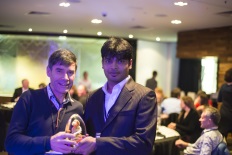Supported by the NZ Institute for Cancer Research Trust Chair in Cancer Pathology, Professor Michael Eccles and his research group in the Department of Pathology are carrying out ground breaking research into cancer and polycystic kidney disease (PKD).
Cancer is the leading cause of mortality in NZ, while PKD is the most common familial inherited disease that affects adults aged 50 years or more. The group is currently pioneering a relatively new research approach (called reduced representation bisulphite sequencing, or RRBS) to investigate the role of genome-wide epigenetic changes (particularly of DNA methylation) involved in both melanoma, and PKD.
Melanoma is an important cancer in New Zealand; this country the highest incidence rate per capita in the world, and consequently it is the most common cause of death for young adult males and females in NZ. Melanoma metastasizes very early in its evolution, and this feature of melanoma is currently being put to the test by the research team.
As an exemplar type of metastasizing cancer, the research team is trying to understand the epigenetic changes that underpin melanoma metastasis. The team has already made som e excellent headway on this, and has published gene expression signatures that distinguish invasive from non-invasive melanoma types. Right now the research team is incorporating this into their quest for relevant epigenetic features of metastasis.
e excellent headway on this, and has published gene expression signatures that distinguish invasive from non-invasive melanoma types. Right now the research team is incorporating this into their quest for relevant epigenetic features of metastasis.
Image: Principle investigator Mike Eccles congratulates Research Fellow Aniruddha Chatterjee on winning the Illumina Emerging Researcher Award at Queenstown Molecular Biology Week.
Key people
Professor Mike Eccles (Principal Investigator)
Dr Cherie Stayner (Research Fellow)
Dr Euan Rodger (Research Fellow)
Dr Peter Stockwell (Scientific Officer)
Suzan Almomani (Assistant Research Fellow)
Antonio Ahn (PhD Candidate)
Chi Sutherland (PhD Student)
Sai Shyam (PhD Student)
Sarah Bowden (MSc Student)
Lorissa McDougall (MSc Student)
Tayla Perreau
Arthur Urbano
Ryan Powell
May 2016: Professor Mike Eccles and his research team have been featured across multiple media platforms after the exciting release of their findings regarding the geographical variations of melanoma gene mutation patterns in New Zealand:
Watch the TV One News interview here
Read the NZ Hearld article here